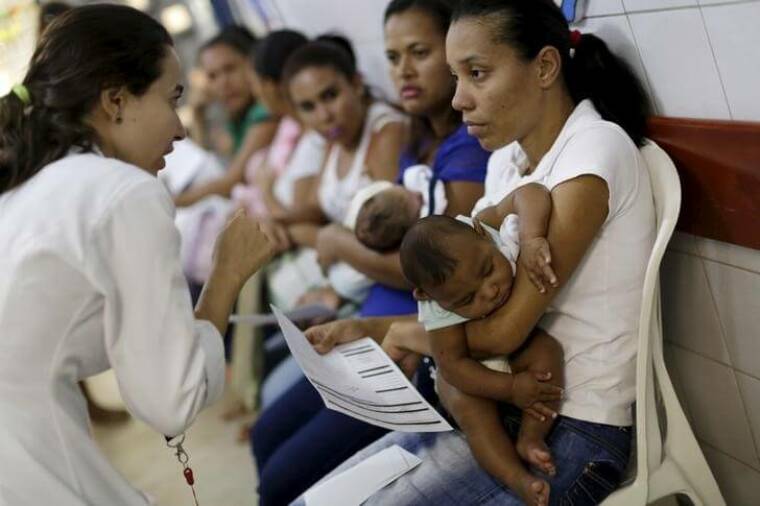Brazil's Zika virus outbreak worse than believed - health official

Brazil's top health official said on Monday that the Zika virus outbreak is proving to be worse than believed because most cases show no symptoms, but improved testing should allow the country to get a better grip on the epidemic.
Health Minister Marcelo Castro told Reuters that Brazil will start mandatory reporting of cases by local governments next week when most states will have labs equipped to test for Zika, the mosquito-borne virus that has quickly spread through Latin America.
The rapid arrival of Zika to Brazil has sparked fear especially among pregnant women after local experts linked the virus to thousands of cases of microcephaly, or abnormally small brains, in newborns.
"Eighty percent of the people infected by Zika do not develop significant symptoms. A large number of people have the virus with no symptoms, so the situation is more serious that we can imagine," Castro said in an interview.
With no Zika vaccine available for the foreseeable future, Brazil's only option is to eradicate the mosquito that has spread the virus, and the government is mobilizing all possible resources and people to destroy its breeding places, he said.
An estimated 1.5 million Brazilians have caught Zika, a virus first detected in Africa in the 1940s and unknown in the Americas until it appeared in May in the poverty-stricken northeastern region of Brazil.
The Pan-American health Organization said the virus has since spread to 24 countries and territories in the hemisphere.
By next week, labs in all but three of Brazil's states will be able to test whether a person has hadZika or not, Castro said.
By next month, the labs will have a test that can detect all three viruses borne by the Aedes aegypti mosquito - dengue, chikungunya and Zika. The test, however, will only be effective during the initial infection period of five days.
Castro said Brazilian researchers are convinced that Zika is the cause of the 3,700 confirmed and suspected cases in Brazil of microcephaly in newborns. He said the virus cannot be transmitted from person to person, only by mosquito.
Brazil will follow the U.S. decision last week to prohibit blood donations from people who have been infected with Zika, he said.
The U.S. Food and Drug Administration, however, has said it is planning to require people who have traveled to an affected country to defer giving blood, but details on how that might work are still being determined.
 Christians don't have to affirm transgenderism, but they can’t express that view at work: tribunal
Christians don't have to affirm transgenderism, but they can’t express that view at work: tribunal Archaeology discovery: Medieval Christian prayer beads found on Holy Island
Archaeology discovery: Medieval Christian prayer beads found on Holy Island Presbyterian Church in America votes to leave National Association of Evangelicals
Presbyterian Church in America votes to leave National Association of Evangelicals Over 50 killed in 'vile and satanic' attack at Nigerian church on Pentecost Sunday
Over 50 killed in 'vile and satanic' attack at Nigerian church on Pentecost Sunday Ukrainian Orthodox Church severs ties with Moscow over Patriarch Kirill's support for Putin's war
Ukrainian Orthodox Church severs ties with Moscow over Patriarch Kirill's support for Putin's war Islamic State kills 20 Nigerian Christians as revenge for US airstrike
Islamic State kills 20 Nigerian Christians as revenge for US airstrike Man who served 33 years in prison for murder leads inmates to Christ
Man who served 33 years in prison for murder leads inmates to Christ


 Nigerian student beaten to death, body burned over ‘blasphemous’ WhatsApp message
Nigerian student beaten to death, body burned over ‘blasphemous’ WhatsApp message 'A new low': World reacts after Hong Kong arrests 90-year-old Cardinal Joseph Zen
'A new low': World reacts after Hong Kong arrests 90-year-old Cardinal Joseph Zen Iran sentences Christian man to 10 years in prison for hosting house church worship gathering
Iran sentences Christian man to 10 years in prison for hosting house church worship gathering French Guyana: Pastor shot dead, church set on fire after meeting delegation of Evangelicals
French Guyana: Pastor shot dead, church set on fire after meeting delegation of Evangelicals ‘Talking Jesus’ report finds only 6% of UK adults identify as practicing Christians
‘Talking Jesus’ report finds only 6% of UK adults identify as practicing Christians Mission Eurasia ministry center blown up in Ukraine, hundreds of Bibles destroyed: 'God will provide'
Mission Eurasia ministry center blown up in Ukraine, hundreds of Bibles destroyed: 'God will provide' Church holds service for first time after ISIS desecrated it 8 years ago
Church holds service for first time after ISIS desecrated it 8 years ago Burger King apologizes for 'offensive campaign' using Jesus' words at the Last Supper
Burger King apologizes for 'offensive campaign' using Jesus' words at the Last Supper Uganda: Muslims abduct teacher, burn him inside mosque for praying in Christ’s name
Uganda: Muslims abduct teacher, burn him inside mosque for praying in Christ’s name